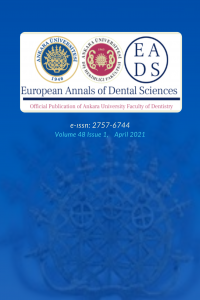KONKA BÜLLOZA GÖRÜLME SIKLIĞININ KONİK IŞINLI BİLGİSAYARLI TOMOGRAFİ İLE ANALİZİ VE MAKSİLLER SİNÜZİT İLE İLİŞKİSİ
Amaç: Konka pnömatizasyonu konka bülloza olarak adlandırılmakla birlikte sıklıkla orta nazal konkada görülen bir varyasyondur. Konka bülloza, kronik sinüzite neden olan faktörler arasında yer almaktadır. Bu çalışmanın amacı konka bülloza sıklığını ve maksiller sinüzit ile ilişkisini araştırmaktır.Gereç ve Yöntem: Bu retrospektif çalışma, 2016-2018 yılları arasında İstanbul Üniversitesi Diş Hekimliği Fakültesi Ağız, Diş ve Çene Radyolojisi Anabilim Dalı’na başvuran ve farklı dental şikayetler nedeniyle konik ışınlı bilgisayarlı tomografi çektiren 621 hastanın görüntüleri değerlendirilerek yapılmıştır.Bulgular: Konka bülloza 621 hastanın 413’ünde (%66,5) görülmüş olup bunların %43,58’inde unilateral, %56,41’inde ise bilateral olarak izlenmiştir. Sol konka büllozanın cinsiyet ile ilişkisi değerlendirildiğinde istatistiksel olarak anlamlı bir fark bulunmuştur (p=0.08) (Kadın erkek oranı 1.14:1). Maksiller sinüzit görülen hastaların sağ tarafta %51,71’inde, sol tarafta %49,14’ünde konka bülloza tespit edilmiş olup maksiller sinüzit ile konka bülloza arasında istatistiksel olarak anlamlı fark bulunamamıştır (p>0.05).Sonuç: Patolojik bulgularla ilişkili olabilen anatomik varyasyonların tespiti doğru tanı için önemlidir. Konka büllozanın kronik sinüzitle ilişkisinde rol oynayabilecek diğer faktörlerin de araştırılması gerekmektedir.
Anahtar Kelimeler:
Nazal konka, konka bülloza, ; kronik sinüzit, anatomik varyasyon, konik ışınlı bilgisayarlı tomografi
Analysis of the Frequency of Concha Bullosa Using Cone Beam Computed Tomogrphy and Relationship with Maxillary Sinusitis
Aim: Although concha pneumatization is called concha bullosa, it is a variation often seen in the middle nasal concha. Concha bullosa is among the factors causing chronic sinusitis. The aim of this study is to evaluate the frequency of concha bullosa and its relationship with the maxillary sinusitis. Material and Method: This retrospective study was carried out by evaluating the images of 621 patients who applied to the Department of Oral, Dental and Maxillofacial Radiology at Istanbul University, Faculty of Dentistry between 2016-2018 and had cone beam computed tomography due to different dental complaints. Results: Concha bullosa was seen in 413 (66.5%) out of 621 patients, of whom 43.58% were unilateral, and 56.41% were bilateral. When the relationship of left concha bullosa with gender was evaluated, a statistically significant difference was found (p=0.08) (Female to male ratio 1.14: 1). Among the patients with maxillary sinusitis, concha bullosa was detected on the right side in 51.71% of the patients and on the left side in 49.14%, and there was no statistically significant difference between maxillary sinusitis and concha bullosa (p> 0.05). Conclusion: Detection of anatomical variations that may be associated with pathological findings is important for correct diagnosis. Other factors that may play a role in the relationship between concha bullosa and chronic sinusitis should be investigated.
Keywords:
Nasal concha, concha bullosa, chronic sinusitis, anatomic variation, cone-beam computed tomography,
___
- 1. Koo SK, Kim JD, Moon JS, Jung SH, Lee SH. The incidence of concha bullosa, unusual anatomic variation and its relationship to nasal septal deviation: A retrospective radiologic study. Auris Nasus Larynx. 2017;44(5):561-70.
- 2. Subramanian S, Lekhraj Rampal GR, Wong EF, Mastura S, Razi A. Concha bullosa in chronic sinusitis. Med J Malaysia. 2005;60(5):535-9.
- 3. Maru YK, Gupta Y. Concha bullosa: Frequency and appearances on sinonasal CT. Indian J Otolaryngol Head Neck Surg. 1999;52(1):40-4.
- 4. Al-Rawi NH, Uthman AT, Abdulhameed E, Al Nuaimi AS, Seraj Z. Concha bullosa, nasal septal deviation, and their impacts on maxillary sinus volume among Emirati people: A cone-beam computed tomography study. Imaging Sci Dent. 2019;49(1):45-51.
- 5. Kocak HE, Keskin M, Kiral MN, Ulusoy HA, Yigitbay M, Kaya KH. Infected Concha Bullosa with Fungus. Iran J Otorhinolaryngol. 2019;31(103):131-3.
- 6. Badran HS. Role of surgery in isolated concha bullosa. Clin Med Insights Ear Nose Throat. 2011;4:13-9.
- 7. El-Taher M, AbdelHameed WA, Alam-Eldeen MH, Haridy A. Coincidence of Concha Bullosa with Nasal Septal Deviation; Radiological Study. Indian J Otolaryngol Head Neck Surg. 2019;71(Suppl 3):1918-22.
- 8. Derin S, Deveer M, Sahan M, Beydilli H. Giant concha bullosa. BMJ Case Rep. 2014;2014.
- 9. Khalife S, Marchica C, Zawawi F, Daniel SJ, Manoukian JJ, Tewfik MA. Concha bullosa mucocele: A case series and review of the literature. Allergy Rhinol (Providence). 2016;7(4):233-43.
- 10. Kalaiarasi R, Ramakrishnan V, Poyyamoli S. Anatomical Variations of the Middle Turbinate Concha Bullosa and its Relationship with Chronic Sinusitis: A Prospective Radiologic Study. Int Arch Otorhinolaryngol. 2018;22(3):297-302.
- 11. Tiwari R, Goyal R. Role of Concha Bullosa in Chronic Rhinosinusitis. Indian J Otolaryngol Head Neck Surg. 2019;71(1):128-31.
- 12. Riello APdFL, Boasquevisque EMJRB. Anatomical variants of the ostiomeatal complex: tomographic findings in 200 patients. 2008;41(3):149-54.
- 13. Khojastepour L, Mirhadi S, Mesbahi SA. Anatomical Variations of Ostiomeatal Complex in CBCT of Patients Seeking Rhinoplasty. J Dent (Shiraz). 2015;16(1):42-8.
- 14. Perez P, Sabate J, Carmona A, Catalina-Herrera CJ, Jimenez-Castellanos J. Anatomical variations in the human paranasal sinus region studied by CT. J Anat. 2000;197 ( Pt 2):221-7.
- 15. Vincent TE, Gendeh BS. The association of concha bullosa and deviated nasal septum with chronic rhinosinusitis in functional endoscopic sinus surgery patients. Med J Malaysia. 2010;65(2):108-11.
- 16. Lee JS, Ko IJ, Kang HD, Lee HS. Massive concha bullosa with secondary maxillary sinusitis. Clin Exp Otorhinolaryngol. 2008;1(4):221-3.
- 17. Stallman JS, Lobo JN, Som PM. The incidence of concha bullosa and its relationship to nasal septal deviation and paranasal sinus disease. AJNR Am J Neuroradiol. 2004;25(9):1613-8.
- Yayın Aralığı: Yıllık
- Başlangıç: 1972
- Yayıncı: Ankara Üniversitesi
Sayıdaki Diğer Makaleler
AVULSİYON SONRASI DİŞ KAYBI OLDUĞU OLGULARDA GÜNCEL TEDAVİ YAKLAŞIMLARI
Betül Büşra URSAVAŞ, Tuğba BEZGİN
İMPLANT DESTEKLİ SABİT PROTEZLERDE OKLÜZYON PRENSİPLERİ
Metehan YILMAZ, Ongun ÇELİKKOL
POSTERİOR SUPERİOR ALVEOLAR ARTERİN KIBT İLE DEĞERLENDİRİLMESİ
Seçil AKSOY, Melis MISIRLI, Kaan ORHAN
Melis YILMAZ, Nur BALCİ, Hilal TOYGAR, Ali ÇEKİCİ
COVID-19- ÇOCUK DİŞ HEKİMLİĞİ AÇISINDAN ÖNEMİ
KIBRIS TÜRK POPÜLASYONUNDA UZAMIŞ STYLOID PROÇES PREVALANSI: RETROSPEKTIF DEĞERLENDIRME
Aida KURBANOVA, Seçil AKSOY, Nimet İlke AKÇAY, Kaan ORHAN
Fatih UÇAR, İrem EREN, Melike BAYRAM
Umut SEKİ, Enver Alper SİNANOĞLU
PEDODONTİDE YER TUTUCULARIN VE YER KAZANDIRICILARIN KOMPLİKASYONLARI
